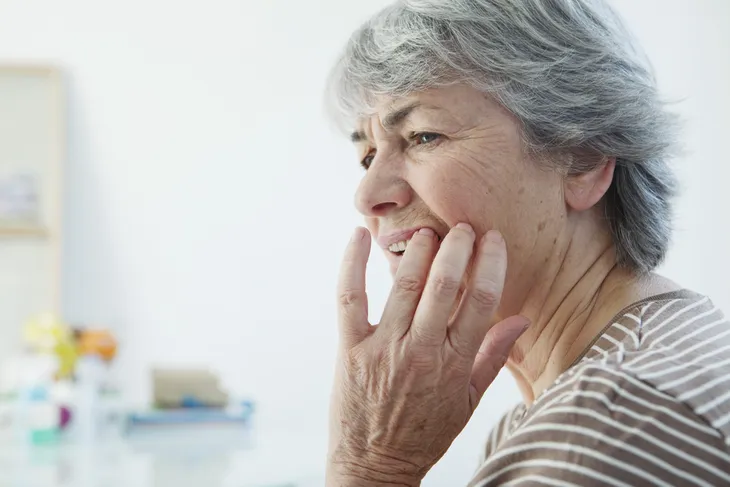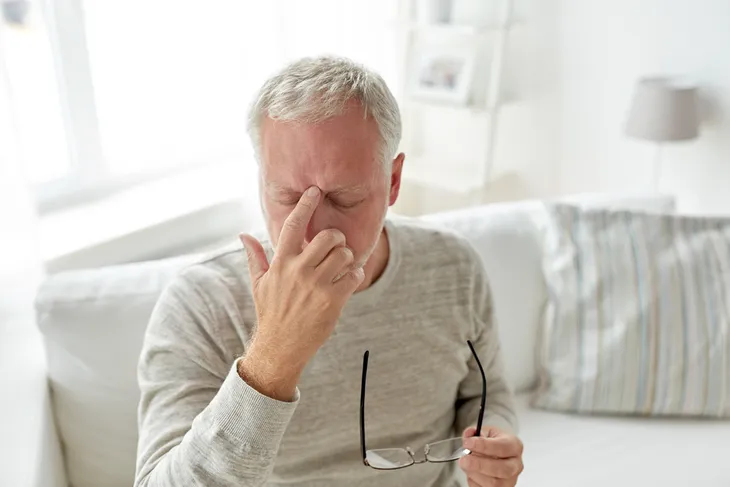We all experience stress at certain times in life—due to the demands of family or work or even social obligations. However, chronic stress and a barrage of cortisol (and other stress hormones) constantly circulating within the body can take a serious and unhealthy toll.
Here are 15 subtle indicators of chronic stress…
Jaw Tenderness
Is your jaw or mouth feeling a little stiff? Chances are that tenderness can be attributed to stress causing you to grind your teeth. Most of us grind away while we’re sleeping, which explains why you likely don’t even realize you’re guilty of teeth grating and gnashing.
According to research from the American Dental Association, grinding of the teeth commonly results from stress. If you’re feeling the results in your jaw, wear a mouthguard, which can protect the teeth and reduce jaw discomfort.
Surprise! A Zit!
You could rightfully blame the greasy hamburger and fries you scarfed down at lunch. However, we all know that stress can cause us to breakout, and breakout bad. Dermatologists at Wake Forest University, in Winston-Salem, North Carolina, link chronic bouts of stress to embarrassing adult acne. Women’s Health explains that stress and anxiety cause our levels of “sex hormones called androgens in your body [to] spike, causing acne to flare up.”
If you’re feeling stressed out and prone to breakouts, you can employ a face wash that contains bacteria-eradicating benzoyl peroxide. Just be sure to use a light moisturizer (one that doesn’t block pores) to keep skin hydrated and avoid further zits.
Skin Irritation
Research notes that stress can also result in skin conditions—from dry patches to more serious pruritus, or chronic itchy skin. In fact, Dr. Gil Yosipovitch, Chair of Dermatology at Temple University Medical School, says that stress can double the chances of skin irritations.
According to Dr. Yosipovitch, ongoing stress can trigger and irritate nerve fibers, resulting in all sorts of underlying skin conditions—such as psoriasis, dermatitis, and even eczema.
Painful PMS Symptoms
Listen up ladies, a change in the symptoms leading up to your monthly period can be a sure sign that you’re too stressed out. For instance, Harvard researchers claim that the sudden emergence of painful menstrual cramps can result from a surge of stress hormones.
Harvard research explains that an increase in stress hormones (i.e., cortisol) often explains an increase in sympathetic nervous system response, and agonizing cramps before and during “that time of the month.”
Bizarre Dreams
Disturbing dreams can disrupt sleep and affect your mood the following day. However, the bizarre dreamscapes are often the result of feeling stressed before you turn in for the night.
Dreams studies conducted by psychologists at Rush University Medical Center, in Chicago, Illinois, found that sleep disruptions caused by stress leave us more likely to dream nasty dreams compared to those who maintain good slumber habits.
Sugar Cravings
While lack of sleep, PMS, and hormones can all result in insatiable sugar cravings, researchers from the University of Pennsylvania point out that stress usually starts this domino effect into the nearest cookie jar or candy store.
The University of Pennsylvania study asked a group of pre-menopausal and postmenopausal participants to share the intensity of their sugar cravings. Researchers blamed stress, first and foremost, for their ice cream, candy, and cookie binges.
Migraines
Migraine researchers have discovered that migraine sufferers are more likely to suffer a stabbing headache following periods of intense stress. That may explain why you’re troubled with a pounding migraine as soon as you clock out for the weekend. Health.com says stress headaches are usually due to that fight or flight response our body naturally resorts to. “Chemicals like adrenaline (epinephrine) and cortisol can cause vascular changes that leave you with a tension headache or migraine, either during the stress or in the ‘let-down’ period afterwards,” writes Health.com. In addition to the chemicals, our bodies tend to get tense when we’re stressed which could also make the pain of a migraine worse.
Experts at Washington University Headache Center say when stress levels plummet and the body and mind readies for a period of relaxation; migraines are most prone to striking.
Canker Sores
Most people have experienced a canker sore at some point in their life, and I think we can all agree they are extremely uncomfortable. While it’s still largely unclear why people develop cankers, it seems to happen more to people who are worn down and stressed. “We don’t really know why people get canker sores, but it’s probably something viral,” says Dale Amanda Tylor, MD, MPH, general and pediatric otolaryngologist at Washington Township Medical Foundation when speaking to Reader’s Digest.
Luckily, these nasty mouth sores are not contagious and aren’t anything to get too worried about. They typically heal on their own with the worst of the symptoms being within the first four days. A canker sore should heal after about a week or so. The source also advises a thorough check that it isn’t a cold sore which is highly contagious and also a common side effect of stress.
Hair Loss
Losing a few (actually more like 100) strands of hair every day is normal, but the American Academy of Dermatology says that chronic stress causes inflammation in the body which leads to more hair loss than normal. Don’t start to panic if you’ve had a bad day at work. It’s not something that just happens overnight. Hair loss is more likely to occur if someone has experienced chronic stress over a long period of time.
Hair loss due to stress is so common that there’s an actual term for it: telogen effluvium. According to Everyday Health, this occurs when there’s a “disruption in the natural growth and rest cycle of hair.” Basically the hair follicles are not working at the rate they are supposed to and therefore are not producing as much hair which leads to hair loss. People who suffer from TE never lose their entire scalp of hair, rather it thins in certain areas, more often the top of the head than the sides. WebMD assures that no matter how severe the TE becomes, it’s always reversible.
Brittle Nails
Similar to other parts of our body, a person’s nails can say a lot about their overall health. Some people have a bad habit of biting their nails when they are frustrated or stressed which causes their nails, or lack thereof, to become extremely worn down. But even people who don’t have a tendency to bite their nails will experience some kind of symptom.
Cosmopolitan talked to New York based cosmetic dermatologist. Dr. Doris Day who talked about a stress-related condition known as Beau’s nails. It looks like “horizontal grooves and ridges that run side to side,” says Day. It tends to show up when someone is going through a period of chronic stress. It’s the body’s way of telling us to slow down, or that there’s something more serious going on internally. If you think you have Beau’s nails, Cosmopolitan recommends contacting your doctor right away because it could mean you’re suffering from diabetes, syphilis, vascular disease, or a zinc deficiency.
Fatigue
We all get tired, especially after a bad day. But people who are chronically stressed or suffering from anxiety are more likely to feel fatigued on a regular basis, even after a good night’s sleep. This is because when the brain is stressed, it’s going nonstop.
Reader’s Digest writes, “it dumps stress hormones into the blood system, which in turn accelerates heart rate and respiration. It activates the sympathetic nervous system that mobilizes our fight, flight, or freeze response.” All of this internal action uses a lot of energy and can make a person feel worn down even if they haven’t overly exerted themselves all that much.
Ringing in Ears
This one might seem unusual, but according to Calm Clinic, as many as 50 million people in the United States have experienced ringing in their ears at some point in their life and 12 million of them experienced it during moments of intense anxiety. While it might seem daunting, a temporary ringing in the ears is fairly normal. There are many people who experience it when they are sick and congested or after a loud concert.
The same source assures that anxiety or stress rarely lead to any kind of long term ringing. It usually occurs for a short period of time and then subsides. Experts believe it happens when there is a great deal of pressure in the head which offsets the blood flow.
Back Ache
Chronic stress and anxiety can make any already existing back pain or chronic pain worse because our body goes into “fight or flight” mode when it’s in distress which causes the muscles to become tense and “ready to spring into action.”
Health.com cites a European study that found people who suffer from anxiety or negative thinking are more likely to suffer back pain, and another American study found a link between anger and/or mental distress and ongoing back pain.
Forgetful
Ever find that you’re a little more forgetful when you’re stressed? There’s a reason for that! It is because the stress hormone cortisol interferes with brain activity. “During acute stress, the hormone also interferes with neurotransmitters, the chemicals that brain cells use to communicate with each other. That can make it hard to think straight or retrieve memories,” says Health.com.
WebMD goes into further explanation by saying stress and anxiety can interfere with concentration because the brain is overstimulated and distracted. Someone who is chronically stressed will have a difficult time retrieving memories, especially if their stress is linked to emotional trauma.
Weight Gain
There are two types of people in the world: those who magically lose weight when they are stressed, and those who gain weight. For many people it’s the latter and according to Health.com who spoke to Philip Hagen, MD, an assistant professor of medicine at the Mayo Clinic in Rochester, Minn., it’s normal. “You can clearly correlate stress to weight gain,” says Hagen.
Why does this happen? Health.com explains that part of it is due to poor eating habits when stressed, but it also has to do with the stress hormone cortisol which causes the body to hang onto fat tissue and “enlarge the size of fat cells.” High levels of cortisol are known to cause more of that uncomfortable but very common abdominal fat. If you are someone who tends to gain weight while stressed, try using exercise as a way to relieve stress and combat belly fat.


















